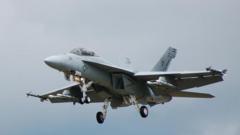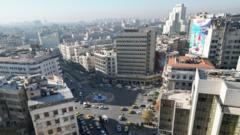In a dramatic escalation of conflict, Israel has intensified air strikes in Syria, reportedly executing over 100 attacks on military targets including facilities linked to chemical weapons as it seeks to curb extremist threats.
Israel Conducts Extensive Air Strikes in Syria Amid Ongoing Turmoil

Israel Conducts Extensive Air Strikes in Syria Amid Ongoing Turmoil
Israeli military actions escalate with over 100 strikes targeting suspected military sites across Syria
As clashes in Syria evolve following the recent overthrow of President Bashar al-Assad, Israel's military has launched a series of air strikes across the country, specifically targeting military sites in Damascus and elsewhere. Ground reports from the UK-based Syrian Observatory for Human Rights (SOHR) indicate that these raids are not isolated incidents, with hundreds executed in just two days. The intensity of these strikes comes amid concerns over chemical weapons, with the UN's Organisation for the Prohibition of Chemical Weapons (OPCW) urging the Syrian government to secure stockpiles.
Israeli officials have justified their military actions by emphasizing the need to prevent arms from falling into the hands of extremist factions now emerging following the Assad regime's downfall. The backdrop of these operations is a meeting of the UN Security Council, where representatives discussed strategies to address Syria’s immediate humanitarian challenges, echoing calls for preserving the country’s territorial integrity.
On a related note, the IDF has made strategic moves into the demilitarized buffer zone established by the 1974 disengagement agreement, a move that Prime Minister Benjamin Netanyahu described as a "temporary defensive position." Israeli officials maintain that their efforts are primarily focused on shielding their citizens rather than engaging in Syrian internal affairs. Defense Minister Israel Katz reiterated this stance, stating the military's intent to destroy "heavy strategic weapons" aligned with perceived threats from Iranian forces.
The air strikes are also contextualized by the recent seizure of Damascus by forces led by the Islamist group Hayat Tahrir al-Sham (HTS), which declared new governance over the city. This transfer of power raises questions about the future dynamics in Syria, with HTS vowing to hold accountable those involved in human rights abuses under the Assad regime, thereby potentially catalyzing further conflict.
In viewing Israel’s actions through various lenses, geopolitical analysts highlight contrasting perspectives. Some argue that Israel's aggressive moves may heighten regional tensions, while others contend they are a necessary response to perceived threats in an increasingly volatile environment. Meanwhile, concerns persist regarding the international community's role, particularly in monitoring the volatile situation surrounding chemical weapon safety.
Historically, Israel has been engaged in military operations within Syrian territory to counter Iranian influence and allied militias, a strategy amplified by rising hostilities in 2023. As global and regional powers recalibrate their strategies in light of shifting dynamics in Syria, the ramifications of Israel's recent military engagements could extend well beyond its borders, reshaping the regional balance of power.
Israeli officials have justified their military actions by emphasizing the need to prevent arms from falling into the hands of extremist factions now emerging following the Assad regime's downfall. The backdrop of these operations is a meeting of the UN Security Council, where representatives discussed strategies to address Syria’s immediate humanitarian challenges, echoing calls for preserving the country’s territorial integrity.
On a related note, the IDF has made strategic moves into the demilitarized buffer zone established by the 1974 disengagement agreement, a move that Prime Minister Benjamin Netanyahu described as a "temporary defensive position." Israeli officials maintain that their efforts are primarily focused on shielding their citizens rather than engaging in Syrian internal affairs. Defense Minister Israel Katz reiterated this stance, stating the military's intent to destroy "heavy strategic weapons" aligned with perceived threats from Iranian forces.
The air strikes are also contextualized by the recent seizure of Damascus by forces led by the Islamist group Hayat Tahrir al-Sham (HTS), which declared new governance over the city. This transfer of power raises questions about the future dynamics in Syria, with HTS vowing to hold accountable those involved in human rights abuses under the Assad regime, thereby potentially catalyzing further conflict.
In viewing Israel’s actions through various lenses, geopolitical analysts highlight contrasting perspectives. Some argue that Israel's aggressive moves may heighten regional tensions, while others contend they are a necessary response to perceived threats in an increasingly volatile environment. Meanwhile, concerns persist regarding the international community's role, particularly in monitoring the volatile situation surrounding chemical weapon safety.
Historically, Israel has been engaged in military operations within Syrian territory to counter Iranian influence and allied militias, a strategy amplified by rising hostilities in 2023. As global and regional powers recalibrate their strategies in light of shifting dynamics in Syria, the ramifications of Israel's recent military engagements could extend well beyond its borders, reshaping the regional balance of power.





















